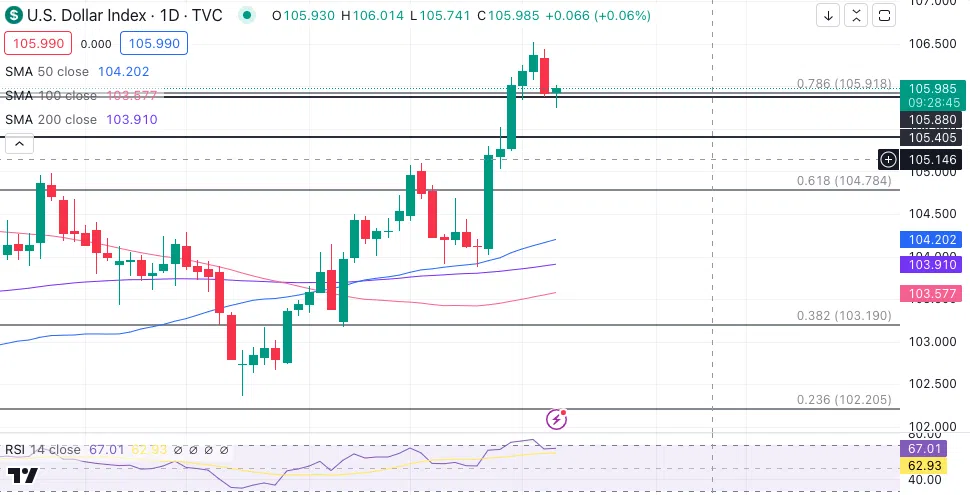-
Best Forex Brokers
Our top-rated Forex brokers
-
Brokers for Beginners
Start trading here
-
Forex Demo Accounts
Learn to trade with no risk
-
ZAR Trading Accounts
Save on conversion fees
-
Lowest Spread Brokers
Raw spreads & low commissions
-
ECN Brokers
Trade with Direct Market Access
-
No-deposit Bonuses
Live trading with no deposit
-
High Leverage Brokers
Extend your buying power
-
Islamic Account Brokers
Best accounts for Muslim traders
-
Market Maker Brokers
Fixed spreads & instant execution
-
All Trading Platforms
Find a platform that works for you
-
TradingView Brokers
The top TradingView brokers
-
MetaTrader4 Brokers
The top MT4 brokers in SA
-
MetaTrader5 Brokers
The top MT5 brokers in SA
-
cTrader Brokers
The top cTrader brokers in SA
-
Forex Trading Apps
Trade on the go from your phone
-
Copy Trading Brokers
Copy professional traders
There’s nowhere else to start today except for the escalation in Middle East tensions. Israel’s (alleged) assassination of two senior Iranian military leaders on April 1st resulted in an unprecedented response from Iran when it launched a massive wave of missile and drone strikes on Israel on Saturday, 13th April.
World leaders have called for calm heads. Though Benjamin Netanyahu, Israel’s PM, has rebuffed attempts to de-escalate the situation, today telling Lord Cameron, UK Foreign Secretary “I want to make it clear – we will make our own decisions, and the State of Israel will do everything necessary to defend itself.”
Needless to say, the sharp escalation – and the possibility of a broader conflict – has spooked the markets. The VIX index, often referred to as the “fear index”, hit 19.6 this week, its highest level since October 20, two weeks after the Hamas attack that triggered Israel’s war in Gaza.
Investors are flocking to haven assets, with the DXY’s (USD Index) bull run – triggered by the Fed’s increasingly hawkish outlook – gaining momentum. More tellingly, gold – usually negatively correlated with the USD – has remained near all-time highs despite the greenback’s strength.
Crude oil prices, down from their highs earlier in the month as the demand outlook has worsened, remain supported by the recent escalation.
Riskier assets, such as stocks, have seen sharp falls in recent days. Yesterday, the S&P 500 hit a two-month low, and European stock markets suffered their worst day in nine months on Tuesday.
It’s important to discuss in more detail the Federal Reserve’s role in market volatility, the stock selloff in particular. On Tuesday, Jay Powell, Chairman of the Federal Reserve, said, “[the Fed] will need greater confidence that inflation is moving sustainably towards 2% before it would be appropriate to ease policy.”
This is the clearest signal yet that higher interest rates are here to stay in the US. It may also force a rethink from other central banks hoping to lower rates this summer – the European Central Bank in particular. Investors around the world are not happy. The US economy may be powering through despite increased borrowing costs, but other economies are suffering, and a global recession is a distinct possibility.
In the short and medium term, as long as the risk of conflict and higher US interest rates remain, the USD will retain its strength. Gold and oil, especially gold, are in a more precarious position, and any de-escalation in the conflict should see a retreat in price for both assets.
Technical Analysis
The DXY eased on Wednesday, dropping down below the 106.00 level (Fibonacci 78.6% retracement of the October – December 2023 downtrend), following the APAC session. Buoyed by Thursday’s better-than-expected unemployment data, the greenback bounced up slightly. However, with so many central banks expressing concerns over the dollar’s strength, many market players seem to be in profit-taking mode, which has seen the DXY stall at 105.97.

Technical Analysis by Alison Heyerdahl using TradingView
With Wednesday’s dip, the RSI dropped below 70, suggesting the potential for upside moves, while technical support from all three moving averages (50-SMA, 100-SMA, and 200-SMA) confirms the same.
Should the bulls take the reins, the 106.52 level from Tuesday would be the focus and beyond that, the 107.00 psychological handle. Higher than that, the index may meet resistance at 107.35, October 2023’s high.
On the downside, the 105.88 level is currently acting as a strong support, and below that, the 104.40 level.
Stay updated
This form has double opt in enabled. You will need to confirm your email address before being added to the list.




























